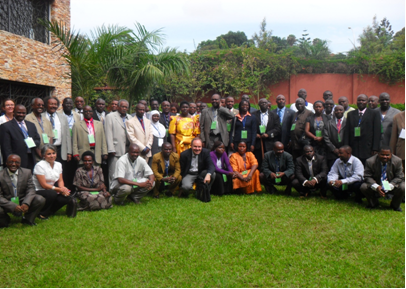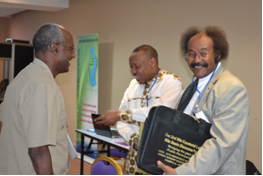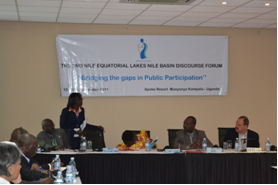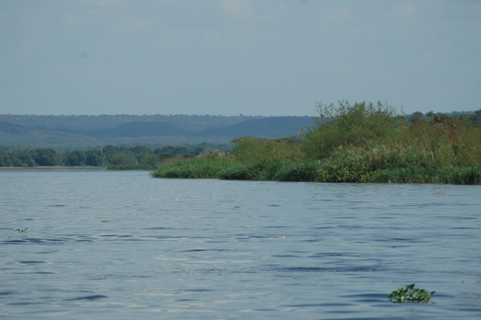
The meeting took place in Kampala, Uganda, gathering Honourable Ministry of Water and Environment of Uganda, Nile Basin Initiative/NELSAP director, World Bank Nile manager, Nile Basin Discourse Vice Chair, NBD Manager, Uganda Nile Basin Discourse Chair, and the senior representatives of the national Nile Basin Discourse fora.

The specific forum objectives were as follows:
- To provide an open and public platform to promote and support continued basin dialogue with governments on power development and trade among Nile Basin countries.
- Provide a learning environment for civil society actors to understanding the nuances of legal, regulatory and pricing regimes for regional power generation, transmission and trade;
- Identify the regional points of action on how best to mainstream community benefit sharing mechanisms into the NELSAP projects from a sub regional and transboundary perspective.

The expected outcomes of the Nile Basin Discourse meeting were as follows:
- Increased understanding and support for continued basin dialogue between state and non-state actors on power development and trade among Nile Basin countries;
- Specific regional points of action on mechanisms to mainstream community benefit sharing mechanisms into the NELSAP projects from a sub regional and transboundary perspective;
- Develop and agree on specific advocacy messages that will help further elaborate on the NEL policy influencing strategy;
- Position Statement or Communiqué on the outcome of discussions.
The geographic scope of the Nile Basin Discourse meeting was as follows:
While the scope of the NBD is the Nile cooperation, the meeting reviewed an assessment of NELSAP’s power development potential, costs and benefits of the interconnection lines projects, community participation, and other initiatives as part of these projects.
During the countries discussion of the findings of NBD studies on power development in the Equatorial Lakes region, the media component has been highlighted as a key failure of attention of the whole study and beyond, to inform and raise awareness about power development projects but also NBD studies about them. The lack of budget allocated to the media educational activities has been pinpointed as a key point of action. (Link to NBD statement. http://www.nilebasindiscourse.org/index.php/e-resource-center/search_result.html

Discussions about NBD report ’Power Development and Power Trade in NELSAP Sub-Region. An Overview’ have raised the following issues for the countries:

Burundi
http://www.nilebasindiscourse.org/index.php/bnbdf.html
- An example of the irrelevance of the law-making process s that the new land law is not known by the populations neither by local elected authorities. There is a need for awareness and information of the local populations;
- On the 28 and 29 October, journalists and government officials have been invited to exchange on the Rusumo project. Communal councils have been invited to discuss on Rusumo with the populations;
- Issue of accurate information about the land status in the report. For example, the report states that land laws are hamonized among Rwanda, Burundi and Tanzania. But in au Rwanda, the land is owned by the state and in Burundi, while the land and infrastructures status is clear, there is a pending status for marshlands and swamps. So there is a need for more information based on the participation of the populations about the content of the laws, and invite the experts to exchange with the communities. Indeed, the process should be done at the communal council level instead of NELSAP office in Kigali. Even in the committee, no communal council participates. In Tanzania, and in the Eastern Africa Community framework, the population could be hosted as there are sufficient lands for migrations from Rwanda and Burundi.
Democratic Republic of Congo
http://www.nilebasindiscourse.org/index.php/drc-ndf.html
- The potential of the Semliki catchment is not addressed in the report, i.e. 72 Mgw;
- Decision making should be informed about the origin of electricity potential in the basin, i.e. the one of Grand Inga for a second example. Instead DRC is importing power while it could give power to Africa and Europe together;
- The risk of NBD to be echoing NBI rationales. Examples:
- The Congo river potential should be highlighted in the report, i.e. 144 Mgw;
- The deforestation issue in DR Congo should be addressed through hydropower investment to save the forests in DRC as the trees are cut for energy use;
- Statistical errors in the report. (Response was that there was a problem with interpretation of the language, and this will be sorted out).
- Weak information flow in DRC as a result of an uneasy access to Kinshasha and the lack of linkages among the Congolese authorities along the 2500 km river.
- Inga has been built 25-30 years ago on the river Congo and flows along 2000 km. A little power is provided for Katanga, and a lot to Zimbabwe and Zambia. However the Bandugu , Western Kasai and Eastern Kasai provinces are still without any access. Nothing has been provided for the peasants organizations and everything for the investors while the rationale is that NGOs will ensure pro poor programmes.
- The specificity of African law-making is not defended by NBD, and it should raise the question about the relevance of external laws which are still imported in Africa without matching the cultures, languages, and definition of life place which are so important for law making in Africa. As a result, the NBD programme have no influence on the peoples. And this is how oil exploitation is chosen instead of tourism.
Kenya
http://www.nilebasindiscourse.org/index.php/kndf.html
- Three basic gaps are as folllows: 1) public disclosure of information, 2) displacement and resettlement, 4) cash for land compensation.
- The committee set up to inform and involved the affected people is not a sufficient initiative. No official meeting has been held by the project to share the resettlement plan in the four countries of the power project;
- Even those involved are not informed about how the project is being implemented;
- No empowered communities for access to information;
- How displacement and resettlement will affect both women and men at household level;
- Strategies to address displacement and relocation should be brought together by NGOs;
Rwanda
- On Rusumo Falls power project, we need to build the capacities as we cannot close the programme and wait until more stakholders are involved. It is better to invest money through for example the involvement of the private sector;
- The environmental issues should be more addressed in the report. NBD has a strong focus on environmental sustainability and most of the projects of transmission lines have looked at it;
- We have to act as we, Rwanda Nile Discourse Forum, have been engaged into NBI discussions since 2001, and since 2002 we have been discussing Rusumo and nothing happens. We need to come up with recommendations so that the CFS can be signed;
- Do the local communities understand the projects? How do they benefit?
Sudan
http://www.nilebasindiscourse.org/index.php/sndf.html
- Who is going to pay for the projects costs if not national aid and development projects?
Tanzania
http://www.nilebasindiscourse.org/index.php/tndf.html
- Appreciated the report and the gaps identified on public participation;
- On the Rusomo project, key stakeholders have not been involved including senior government officials and not only at the community level;
- Among the countries sharing the project, what would be the impact on the rest of the countries if a civil war happened in one country? Political stability should be addressed for example by CSOs advocacy for peace and good governance in their countries.
Uganda
-
‘The project is like a serpent flower very beautiful, having beautiful leaves and flowers, yet the roots are rotten. The flowers and leaves are the people above (district and national leaders) and the roots are the local communities. The communities know nothing about the project and they won’t benefit’;
-
The question of the tariffs should be addressed, and the difference between urban and rural peoples;
-
The issue of property compensation before the construction of power transmission and interconnection lines. UETCL must give prior and fair compensation to property owners;
-
Price variation while Uganda is selling a lot of power and to countries which should not be importing such as DR Congo;
-
The corruption issue and the policies to address it in the context of a lack of information about power trade, the budget benefits, the purchasers combined with climate change risks of unsufficient water for different uses and all residents;
-
Need of an effective handling mechanism for grievances and a proposal of a witness NGO as a third party;
-
The issue of the compensation rate, which is supposed to be set by the district chief should be further discussed;
-
Rusumo Falls has been declassified from a multipurpose dam to a single purpose dam, and it should be discussed.
Conclusions-Proposals of the working groups
Proposals of the working groups
Before the issuance of the NBD NEL position statement on ‘Bridging the gaps in public participation’ in the Nile Basin projects at the end of the workshop, three working groups have identified issues and priority actions at sub regional and regional level on 1) Rusumo power project, 2) power interconnection projects, 3) NEL regional power development programmes - Policy, institutional and legal coordination, and 4) Nile cooperation.
Group 1. Rusumo hydropower project
Goals
-
Identify the three most important concerns for civil society with respect to the Rusumo Power Project.(Goal 1)
-
What would be the benefits for the communities out of the Rusumo hydropower project and the way to ensure them? (Goal 2)
-
In respect to the Rusumo hydropower projects, what are the priority action points for NBD to follow up after this workshop at a subregional and regional level? (Goal 3)
Goal 1. The common concerns for civil society
Rusumo Falls is a project that is shared by different countries, i.e. of a transboundary nature. The assessment for each country has led to different plans such as the resettlement plan. There is no commonality, each country has its own specificities yet the people live in the same neighborhood where they even share some culture. NBD must concentrate on helping the projects to be harmonized so that not so many similar procedures should be engaged.
Goal 2 .The benefits for the communities and the ways and to ensure them
NELSAP is a secretariat, and cannot reach all levels but just look at a regional and international engagement. NELSAP set up the foundations rooted in the interest of the governments. Therefore, NBD as a network could facilitate the grassroots involvement as long as NELSAP can only reach up to the district level. Hence, NBD via the national discourse fora could be the implementation channel for grassroots involvement. In the mentioned NELSAP strategies, it is clear that CSOs are not considered in the cultures of our governments. We need an improvement in the way business is being done. We are not accusing, and CSOs are not willing to block the progress of the project. We request to have an inclusion mechanism on these issues. Engagement into NELSAP/NBI meetings is a step but we need a step forward. NBD is to be considered as a stakeholder.
2. New interventions
- We should work as on organization for social mediation. We need to understand the issues at grassroots level and at the high level and methodological aspects on various issues such as HIV/AIDS, portable water, recruitment of experts, employment. How do we address the issues of our communities, and the benefits of the communities?
- Improving awareness and media houses engagement, e.g. community radios in Rwanda work so well. Let us use the media and identify the easiest way of our communities. We need to source funds for this. Our communities should be part of the group that makes contributions and the policy makers
Goal 3. Priority actions at sub regional/ regional
a. We need to focus on how participation at a lower level could be mainstreamed, how does NBD work with NELSAP to help community participation;
b. We have to popularize and interpret the results of the studies that were presented yesterday for an outreach to the communities;
- We need to know all the processes of NELSAP and its projects. We need to understand the desire of our communities. We should constitute a communication strategy of two ways and sensitization on the plans and prospects of the project. We need to guarantee decentralization, planning and implementation as well as communal planning for a mainstreaming into development plans;
- There is no guarantee that each household could benefit or have electricity. We need to inform NELSAP of the communities concerns. We can have a specific MoU enhancing civil society’s representation;
- We as NBD were invited but as observers. However, NELSAP representative may address this issue and during the coming meeting in November, NBD will be invited officially;
- Gender issues must be addressed in all countries;
- We need to strengthen the capacity of our communities for income generation activities to enhance sustainability;
- Documents are available and NDF coordinators have a right of access to these documents. Comments are expected from NBD so that they are included in the documents or studies. But national policies dictate what national strategies are. We need to consult different authorities for factual information;
- We need a follow up on recommendations that came from RAP, LADP and other consultancies as well as studies to address community grievances via existing committees at national level.
Group 2. Interconnection projects
Goals
- Identify the 3 most important concerns for civil society with respect to the interconnection project; (Goal 1)
- What types of benefits should NBD advocate for and how should they be developed to ensure local communities in the transmission corridors are better off? (Goal 2)
- In respect to the interconnection projects, what are the priority action points for NBD to follow up after this workshop at a subregional and regional level, and at the national level? (Goal 3)
Goal 1
Issues
- Stakeholder involvement and information sharing;
- Compensation;
- Involvement of witness CSOs;
- Others – rural electrification.
Policy message 1
- To provide enhanced stakeholder engagement and information sharing.
Action points
- NBD to be more involved in advocacy through several strategies, e.g media, talk shows;
- Other advocacy strategies.
Policy message 2
- To ensure the streamlining of compensation modalities.
Action points
- To engage with institutions involved in land valuation, rates and to update them;
- To engage cultural leaders and village leaders in compensation processes;
- To mainstream gender equity in the considerations for compensation
- To ensure there is no other discrimination.
Policy message 3
- To engage witness CSOs in the project implementation units.
Action points
- To lobby the project implementation unit to recruit witness CSOs;
Goal 2
Issues
- Subsidiary development projects to improve the livelihoods of the communities in the transmission corridors, e.g. water supply;
- Increased access to power and subsidies for rural electrification;
- A psychosocial support and support in planning and use of compensation resources by less informed and vulnerable groups through local community-based organisations.
Priority action points
Sub regional level
- To harmonise guidelines, and policies on compensation for inter-country power transmissions;
- To engage the governments for tariffs harmonization through discussions and other strategies within regional groups e.g NELSAP, NBI;
- To encourage joint inter-state investments in power generation that will make it cheaper due to low cost in procurement.
Regional level
- Identify the best practices in other projects and scale up in the regional projects;
- NBD to engage NBI to improve participation in the projects.
National level
- To follow up recommendations from assessments and bring them to the communities through local meetings and forums;
- To consult with PIUs to get up to date information on project implementation;
- To lobby the governments so that NBI and NBD have same or common information protocol. This allows both to feed information on the internet
- CSOs to ensure that environmental challenges identified during the studies and EIAs are addressed and mitigation measures are carried out.
Group 3. NEL region power development programmes (institutional, legal and policy coordination.)
Goals
- Identify the 3 most important concerns for civil society with respect to the policy, legal and institutional coordination (Goal 1);
- What types of benefits should NBD advocate for and how should they be developed to ensure local communities benefit from the policy, legal and institutional coordination? (Goal 2)
- In respect to the Nile from the policy, legal and institutional coordination, what are the priority action points for NBD to follow up after this workshop at a subregional and regional level, and at the national level? (Goal 3)
Goal 1. Common concerns for civil society - Approaches for a transboundary project
- To raise awareness of common interests for the project;
- To create transboundary committees for overseeing the implementation of project and involve community members;
- To create transboundary cooperation frameworks or MoU between concerned states referring to the NBI CFA, and other international conventions;
- To integrate the compensation aspects as part of the project design.
Why these approaches?
- To ensure the project benefits for all local communities;
- To bring communities as stakeholders of the projects.
Goal 2. Benefits for the communities - Measures that NBD can propose for countries with weak capacity
- To create enough advocacy and build capacity of local communities through trainings, workshops to help them raise their case and concerns;
- To work with the other stakeholders (media, private sector, academics) to raise awareness;
- Increase collaboration and information sharing with NBI and NELSAP in particular.
Goal 3. Priority action points - Capacity gaps for NBD
|
Gaps |
Proposed Solutions |
|
Lack of financial and Human resources capacity |
Increase found raising efforts |
|
Lack of collaboration and information sharing |
l Reinforce the implementation of the MoU between NBI and NBD l Increase advocacy |
Group 4. Nile cooperation
Goals
- Identify the 3 most important concerns for civil society with respect to Nile cooperation (Goal 1);
- What types of benefits should NBD advocate for and how should they be developed to ensure local communities benefit from the Nile cooperation? (Goal 2)
- In respect to the Nile from the Nile cooperation, what are the priority action points for NBD to follow up after this workshop at a subregional and regional level, and at the national level? (Goal 3)
Goal 1
- Specific areas such as climate change issues including water shade management should be approached as a joint action;
- NBD should encourage governments to have harmonized water policies, laws and regulations. This will address compensation during the projects implementation;
- There is a need for confidence building through exchange of information knowledge, education programmes, and exchange visits;
- An international team should work in agricultural projects e.g Egypt investing in Bujagali and other trans-boundary development mechanisms;
- Regional and international organizations should lobby member states to sign and ratify the CFA. e.g. the AU, COMESA and the UN.
Goal 2
- NBD in conjunction with governments should sensitize and create awareness in member states about the benefits of cooperation;
- Lobby their governments to signs the CFA.
Goal 3
- NBD should encourage and engage respective governments to promote projects/programmmes that would ensure food security in the region, e.g Gezira irrigation projects and LEAF fisheries project and the benefits shared in the region;
- NBD to lobby for benefit sharing in power generation and interconnection;
- NBD in conjuction with the governments should promote equity in terms of employment and coordinate the opportunities for citizens involvement in the regional programmes and projects.
Proposed next steps by GWP Eastern Africa
GWP position is in line with NBD policy brief ‘Nile Basin Power Projects: Advancing cooperation and community benefits'. NBD pinpoints innovation as a key issue to increase financial flows in the energy sector in the basin, such as innovative financing instruments to strengthen regional energy markets.
As a remainder to the options of trade and global financial transactions, and not only power trade options which are currently being finalised within the NELSAP basin wide power programme, there is a current G20 initiative whose most recent step was on 21 st October. On that day, a blueprint for a multilateral treaty on financial transactions with options for innovative finance options to address global developmental and environmental challenges, i.e. the shortfall in Official Development Assistance, has been presented. The blueprint report was issued in 2009 as a request to the International Financial Transactions for Development. 2009 estimates for this funding gap are in the range of $324-336 bn per year between 2012 and 2017 ( $156 bn for climate change, $168-180 bn for ODA – Official Development Assistance). The global financial crisis and the recent debt crisis in Europe has continued to increase financial pressure on the countries. A “global solidarity dilemma” leads to recommendations to resolve the dilemma through innovative finance. The dilemna means that the growth of the global economy has not paid for global public goods, with the risk of global economic, financial, social and environmental instability, which would undermine the foundations of globalisation.Innovative finance are mechanisms based on global activities that call for generated stable flows, and the report gives a key role to the financial sector. The report analyses their options of innovative finance mechanisms based on criteria of sufficiency, market impact, sustainability as well as legal feasibility.
Civil society networks have supported the blueprint for innovative legal mechanisms which was presented on the 21st of October. NBD and its partners such as GWP could ally their efforts during the next round of the G20 and the World Water Forum, both under the same presidency to advocate for case studies leading to recommendations for options of innovative finance for transboundary water as a public good. Other campaigns include Beyond 2015, the White Paper on the ethics of climate change, the UN indigenous peoples platform campaigns, youth volunteerism as part of the African Union initiative, and Unit in Climate in preparation to Rio + 20 Declaration.